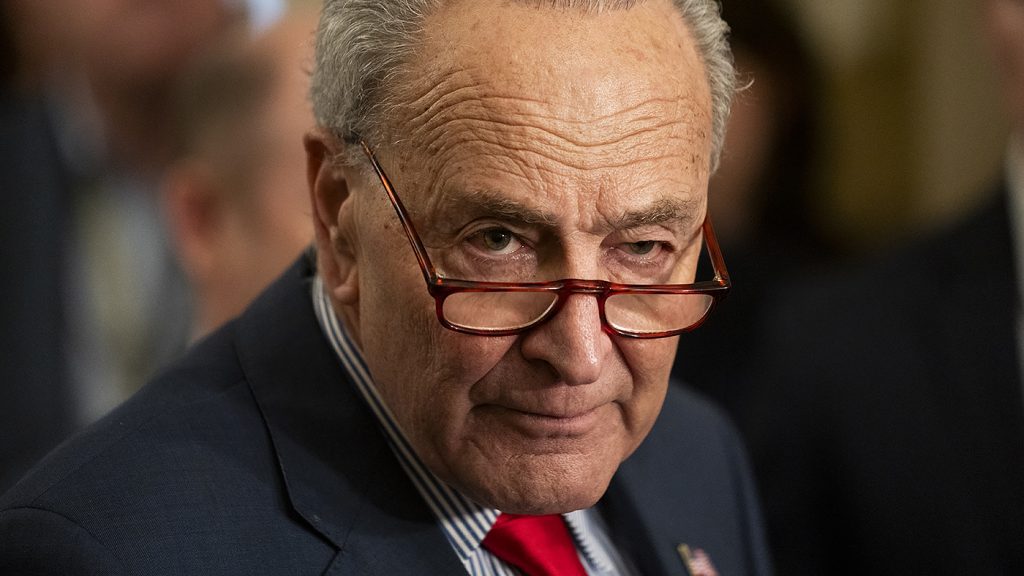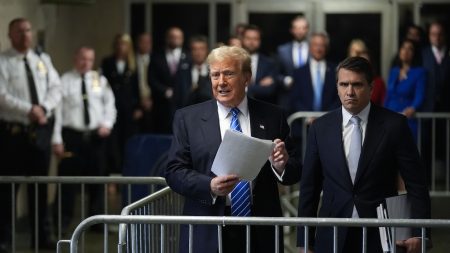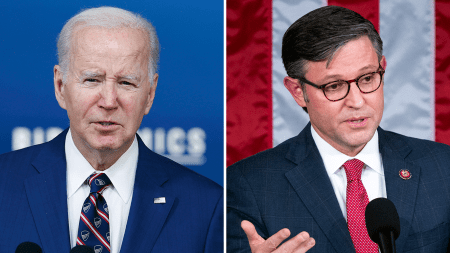The Senate is under more and more pressure to pass a law that might forbid TikTok after it got through the House with overwhelming bipartisan support and the approval of President Biden.
The Protecting Americans From Foreign Adversary Controlled Applications Act easily passed the House in a 352-56 vote Thursday.
The law would make ByteDance, the China-based owner of TikTok, sell off TikTok within about five months or else face a ban on U.S. apps and web hosting services.
Right after it moved forward, senators who have been loud about the risks TikTok brings called for a vote in the upper chamber and the White House urged “swift action” in the Senate.
“We are glad to see this bill move forward,” press secretary Karine Jean-Pierre told reporters aboard Air Force One.
“We will look to the Senate to take swift action,” she added.
Senate Majority Leader Chuck Schumer (D-N.Y.) said the Senate “will review the legislation when it comes over from the House” and did not commit on a course of action.
Schumer has faced pressure from senators in both parties over a lack of floor action on popular bipartisan bills that would tighten rules on Big Tech companies. But the resounding biparisan vote in the House is embolding Senate supporters of the House TikTok bill to keep pushing for its passage.
Sens. Mark Warner (D-Va.) and Marco Rubio (R-Fla.), the top members of the Senate Intelligence Committee, are leading the push for the bill in the Senate.
“We are united in our concern about the national security threat posed by TikTok — a platform with enormous power to influence and divide Americans whose parent company ByteDance remains legally required to do the bidding of the Chinese Communist Party,” Warner and Rubio said in a joint statement immediately after the bill passed the House.
“We were encouraged by today’s strong bipartisan vote in the House of Representatives, and look forward to working together to get this bill passed through the Senate and signed into law,” they added.
The supporters said the divestiture would eliminate risks they said are posed by the Chinese-based parent company potentially gaining access to data about U.S. users.
TikTok has pushed back on the allegations that it poses national security risks and has urged the Senate against passing the bill.
“This process was secret and the bill was jammed through for one reason: it’s a ban. We are hopeful that the Senate will consider the facts, listen to their constituents, and realize the impact on the economy, 7 million small businesses, and the 170 million Americans who use our service,” the spokesperson said in a statement.
Sen. Josh Hawley (R-Mo.), a fierce critic of both China and the tech industry, said that the bill should be called for a quick vote.
“NOW is the time to act on TikTok and stop China spying. The Senate should take up this bill immediately,” Hawley wrote on X, the platform formerly known as Twitter.
But the is also bill faces opposition and concern from other senators across party lines. Former President Trump has also come out against the measure and could boost pressure on Republicans to tank it before it gets to Biden.
Sen. Rand Paul (R-Ky.) stated on X that the bill is a “harsh measure that limits free speech, violates constitutional rights, and disrupts the economic activities of millions of Americans.”
“This act is not protecting our nation—it’s a troubling grant of unprecedented power to President Biden and the Surveillance State that jeopardizes the fundamental aspects of American digital innovation and free speech,” Paul added.
The bill would also empower the president to identify other apps controlled by foreign adversaries with links to China, Russia, North Korea, and Iran.
Senate Commerce Committee Chair Maria Cantwell (D-Wash.) expressed in a statement her “very concerned about foreign adversaries’ exploitation of Americans’ sensitive data and their attempts to create backdoors in our information communication technology and services supply chains.” However, she did not indicate support or opposition to the bill promoted by the House and Biden at this time.
“These are national security threats and it is good members in both chambers are taking them seriously. Following today’s House vote, I will be talking to my Senate and House colleagues to try to find a path forward that is constitutional and protects civil liberties,” Cantwell said in a statement.
The bill is also facing criticism from progressives, who argue that a TikTok ban could restrict free speech. Reps. Alexandria Ocasio-Cortez (D-N.Y.) and Maxwell Frost (Fla.) opposed the bill on those grounds.
Sen. Ed Markey (D-Mass.), who has been outspoken in pushing the Senate to update privacy laws to protect kids on social media, indicated he would not vote for the bill and urged the Senate to instead take up his bipartisan update to the Children’s Online Privacy Protection Act (COPPA).
“We don’t have only a TikTok problem—we have a Big Tech privacy problem. From Meta to Amazon to Discord, US-owned companies are exploiting children & teens for profit. We don’t need to ban TikTok to address their invasive practices. Passing my COPPA 2.0 is the solution. We must act now,” Markey said in a post on X.
COPPA advanced out of the Senate Commerce Committee in July with bipartisan support but has not been called to a vote. Schumer has also declined to call up other bills that aim to protect children online that have advanced out of the Commerce and Judiciary Committees, even after pressure built from a recent hearing that featured the CEO of TikTok, among other platforms.
Some critics of the bill said lawmakers should instead take a broader approach to data privacy and tech regulation that doesn’t solely focus on TikTok.
Experts said that the bill, even if it advances out of the Senate and is signed by Biden, may encounter the same legal challenges that have stalled previous attempts to ban TikTok — including from Trump.
Trump’s current opposition to a potential TikTok ban emerged after he met with Jeff Yass, a prominent GOP donor and investor in TikTok. Trump said Yass did not bring up TikTok during the conversation.
Even though Trump opposed the bill, only 15 House Republicans voted against it.









